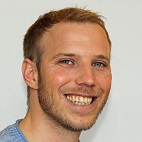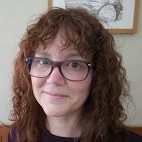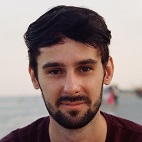Meet the 2019-20 Vice-Chancellor's Fellows
 Andrew Fraass - Datamining the past to understand the future of marine pelagic ecosystems
Andrew Fraass - Datamining the past to understand the future of marine pelagic ecosystems
Andy’s Fellowship will work on understanding the role of biology in the carbonate cycle. The oceans currently absorb an outsized amount of carbon dioxide.
Zooplankton called planktic foraminifera produce carbonate (CaCO3) shells. Those shells make up a substantial amount of the carbonate on the seafloor. This carbonate acts like a buffer, helping to stabilize the ocean’s chemistry. Those shells are also the world’s best fossil record, one good enough we can examine how species evolve, not genera or families like we usually need to use. We know that when these plankton go extinct there’s a change in the amount of carbonate deposited. Using a new database with more than 50 years of scientific ocean drilling data, Andy will work to understand what the key risks are to plankton during several past examples of climate change and how those key risks are expressed in the deposition of carbonate.
 Becky Mars - Predictors and patterns of self-harm thoughts and behaviour
Becky Mars - Predictors and patterns of self-harm thoughts and behaviour
Self-harm is a major public health concern. It is the strongest predictor of suicide and is particularly common among young people; a group in which rates of self-harm and suicide appear to be rising, yet we know little about the natural course of this behaviour.
Becky’s Fellowship will use sophisticated longitudinal modelling techniques and innovative digital health methods to identify predictors and patterns of self-harm thoughts and behaviours; both over the longer-term (from adolescence to adulthood) and the short-term (over hours/days/weeks).
Although self-harm is very common in young people, most do not seek help. This makes it difficult to provide support. Becky plans to use record linkages between self-reported self-harm from the Avon Longitudinal Study of Parents and Children (ALSPAC) and primary care records to find out whether young people who self-harm are either (1) not visiting a GP or (2) visiting a GP for other reasons and not telling them about their self-harm. She also plans to use machine-learning methods to look for factors that will help GPs to better identify young people who have self-harmed .
 Ben Kasstan - Having ‘faith’ in sexual/ity and reproductive wellbeing
Ben Kasstan - Having ‘faith’ in sexual/ity and reproductive wellbeing
Relationships and sex education (RSE) is changing in England to be more inclusive and comprehensive, but this forthcoming policy-change has emerged as a major conflict between minority groups and ‘the state.’
A social and legal dilemma is visible with rights being pitched in opposition: the right to freedom of religious practice, health protection, and the rights of sexual minorities to civic protection to the full extent of the law. Ben will query perceptions of sexual/ity wellbeing and reproductive health, and the discursive ways in which ‘rights’ to protection are articulated in select faith schools and communities. Evaluating expectations of adolescent rights to sexual/ity and reproductive protection is integral to promoting health and wellbeing across the life course, to ensure that people are equipped with the formative knowledge to make informed and appropriate decisions about their future sexual and reproductive health.
 Joseph Webb - Conversation Analysis of GP consultations for patients with learning disabilities
Joseph Webb - Conversation Analysis of GP consultations for patients with learning disabilities
Joe is a qualitative researcher with a particular interest in communication, people with learning disabilities, and people living with dementia.
Joe’s Fellowship project focuses on communication between patients with learning disabilities and clinicians in primary care services. People with learning disabilities (LD) die on average 16 years prematurely from preventable deaths. Communicational difficulties reduce access to medical care and play a major role in the health inequalities of patients with learning disabilities. GP appointments are often the gateway for patients with LD patients to interact with health services.
Joe’s interdisciplinary research program combines Conversation Analysis, a rigorous method for studying communicational patterns, with co-research with people with learning disabilities addressing: (1) What communicational issues arise during these appointments? (2) How do communicational micro-issues relate to macro-health inequalities? The aim of the research is to provide co-produced guidance for addressing some of the health inequalities experienced by patients with LD when attending a GP appointment, and to consolidate a research program using Conversation Analysis and co-production to improve interactional aspects of care for populations with communication difficulties.
 Lindsey Porter - The ethics of recreational drugs
Lindsey Porter - The ethics of recreational drugs
The ‘War on Drugs’ model is being gradually abandoned, in policy thinking as well as public sentiment. Nonetheless, many people still feel there is something bad about using drugs: something not quite right about getting high, even setting aside associated harms.
This vague intuition has significant consequences for individual health and for social wellbeing. It affects support for needle exchanges and drugs testing, reduces healthcare funding for drug-related conditions and rehabilitation, and restricts potentially valuable research. It also informs differential policy treatment of illicit drugs and legal ones such as alcohol and tobacco, a differentiation that often fails to track health and public well-being outcomes.
Lindsey’s research aims to understand the normativity of drug use – how to understand it as an activity and a choice, from moral, prudential, health and wider well-being perspectives.
 Maria Carolina Borges - Unravelling the metabolic pathways of cardiovascular diseases across the life cycle
Maria Carolina Borges - Unravelling the metabolic pathways of cardiovascular diseases across the life cycle
Using state-of-the-art technology, it recently became possible to have a fine-grained snapshot of a person's metabolic state by simultaneously quantifying hundreds to thousands of metabolites (i.e. small molecules produced by cells) in the human body.
This has substantial potential to lead to a much better understanding of factors involved in the development and progression of cardiovascular diseases and to improve how we prevent and treat these diseases.
Carolina’s project is focused on exploring the effect of the metabolome, the global collection of metabolites, on the development and progression of cardiovascular diseases, such as coronary artery disease, stroke, and heart failure, in large-scale population studies. Findings from this project have substantial potential to reveal novel targets for clinical intervention and improve the unsustainable attrition rates in drug development.
 Myles-Jay Linton - Understanding mental health and wellbeing within the ‘student journey’
Myles-Jay Linton - Understanding mental health and wellbeing within the ‘student journey’
In 2017 the Institute for Public Policy Research reported that 94% of universities recorded a rise in the demand for counselling services over a five-year period.
Further, in 2018 a national YouGov survey reported that more than a quarter of students at UK universities indicated that they experienced a mental health problem (27%) – half of whom stated that these difficulties interfere with their daily activities. Despite this challenging climate, higher education has an evidenced capacity for empowering learners, fostering communities, and positively transforming the futures of students.
Myles’ project will investigate transitions into (and within) university, and experiences of social isolation among students. The research will utilise both quantitative and qualitative approaches, engaging cross-faculty expertise within Bristol Medical School and the School of Education. The goal of the work will be to generate evidence to shape practice locally at the University of Bristol, in addition to bi-direction engagement with external experts across the higher education sector.
 Robert Chapman - Health and Wellbeing for a Neurodiverse Age
Robert Chapman - Health and Wellbeing for a Neurodiverse Age
Robert’s project will analyse theories of mental health, wellbeing, and the good life in the light of the rise of the neurodiversity movement.
The concept of neurodiversity implies a rejection of the species-standard functional norms relied on by various dominant approaches, and instead embraces diversity itself as the norm. This allows us to challenge leading conceptions of what is normal or healthy, as well as open up new ways of conceptualising what it means to function well and flourish as a human.
Rethinking our concepts of mental health and wellbeing will have important implications for ethical and psychiatric theory, as well as for disability policy and clinical practice.
 Shamik DasGupta - Neural and genetic control of temporal integration
Shamik DasGupta - Neural and genetic control of temporal integration
Our ability to integrate information that comes as a discrete packet is critical for cognitive processes like decision-making, speech and language, working memory or navigation. For example, during walking, even with our eyes closed, we have an approximate estimation of how far we have walked because our brain can integrate body movements to calculate positions.
Shamik's research will be directed towards understanding how the brain integrates across time – i.e. uses temporal integration – to perform sensory-guided decisions. Using the fruit fly Drosophila melanogaster as a model system, he will isolate candidate genes for a role in decision-making and monitor neuronal activity during decision-making under a virtual-reality arena.
By unravelling the molecular instructions through which different genes influence decision-making, Shamik's work will aid in understanding the functions of these genes, their targets, and their neuronal sites of action in a broader context.
Shamik will be starting his lab at the University of Bristol as a Sir Henry Dale Fellow in 2020.
 Sotiria Fotopoulou- Data Intensive Astronomical Analysis (D.I.AN.A): the co-evolution of supermassive black holes and their host galaxies
Sotiria Fotopoulou- Data Intensive Astronomical Analysis (D.I.AN.A): the co-evolution of supermassive black holes and their host galaxies
Observations and numerical simulations point towards a coevolution between galaxies and the supermassive black holes (SMBH).
During the accretion phase of gas onto SMBHs, they appear as active galactic nuclei (AGN) shining across the electromagnetic spectrum. However, the rarity of this phase, and the complex obscuring structure of gas and dust around the black hole are an impediment in the creation of complete and sizable samples of AGN across cosmic time and cosmic environment. Hampered by the lack of complete samples of AGN, their impact on galaxies is still described with phenomenological models.
This project aims to exploit current and future large datasets to better understand the impact of AGN in galaxy evolution. Specifically, by creating an automated data fusion framework used to produce a Golden Sample of well characterized galaxies and AGN. Such sample will be further used for the creation of machine-learning models applied on the identification and characterization of AGN from Euclid and LSST. Finally, modelling the evolution of AGN as a function of cosmic time and large scale environment will provide insights on their suspected coevolution.
 Tomasz Maciazek- Towards new computational methods in quantum science by exploring the particle exchange symmetry
Tomasz Maciazek- Towards new computational methods in quantum science by exploring the particle exchange symmetry
In our everyday lives the behaviour of observed objects does not depend on whether they are identical or not. However, the microscopic world is governed by laws of quantum physics that open up new possibilities for the collective behaviour of identical quantum particles.
Research exploring this phenomenon has led to inventing lasers, superconductors and explaining stability of matter around us. Current studies of identical quantum particles are leading to a revolution in digital innovation.
Tomasz’s project will provide computationally efficient tools for approximately constructing the so-called generalised Pauli principles. The insights of Tomasz’s work will be subsequently applied to develop next-generation numerical methods of computing the electronic structure of chemical molecules. The second branch of his project aims at a better understanding of anyonic quasi-particles that play key roles in fault-tolerant quantum computing. Tomasz will focus on recently discovered simple models of anyons for particles constrained to move on complex networks. The main goal is to provide new robust architectures for quantum computers and investigate long-standing problems concerning the behaviour of anyonic particles in complex quantum materials.
 Victoria Mascetti- Modelling and Repairing Congenital Heart Disease
Victoria Mascetti- Modelling and Repairing Congenital Heart Disease
Victoria’s research focuses on the interface of stem cell and developmental biology; this synergism has the power to unveil paradigm shifting insights about the onset of developmental defects.
As a Vice-Chancellor’s Fellow, Victoria will use human stem cells and embryonic development as a platform to explore the regulation and molecular mechanisms of human heart formation during the onset of congenital heart disease. Congenital heart disease occurs as an abnormality in heart structure during foetal development. The goal of Victoria’s research is to improve our understanding of the onset of congenital heart disease and to generate targeted repair strategies in the dish. Victoria works in pursuit of novel regenerative technologies to modify the course of human disease.
 Vivian Kong - The Management of Transnational Destitute British Subjects in Hong Kong, 1900-1941
Vivian Kong - The Management of Transnational Destitute British Subjects in Hong Kong, 1900-1941
Building on her earlier research on Hong Kong’s transnational connections, Vivian’s new project examines the ways in which such connections complicated colonial practices by studying the management of transnational destitute British subjects in Hong Kong.
Transnational travel is usually associated with elites, but many impoverished individuals could travel to colonial Hong Kong from other Asian port cities, thanks to their British nationality and well-connected steamship routes. This project will focus on how the Hong Kong government worked with civil society, different departments in Whitehall, and other political regimes in the Asia-Pacific region to govern and assist destitute British subjects who arrived in the colony from Manila, Shanghai, and Singapore. In doing so, it will explain how decisions were made when colonial governance involved international networks and institutions and how a middle-class civil society affected colonial practices in twentieth-century Asia.